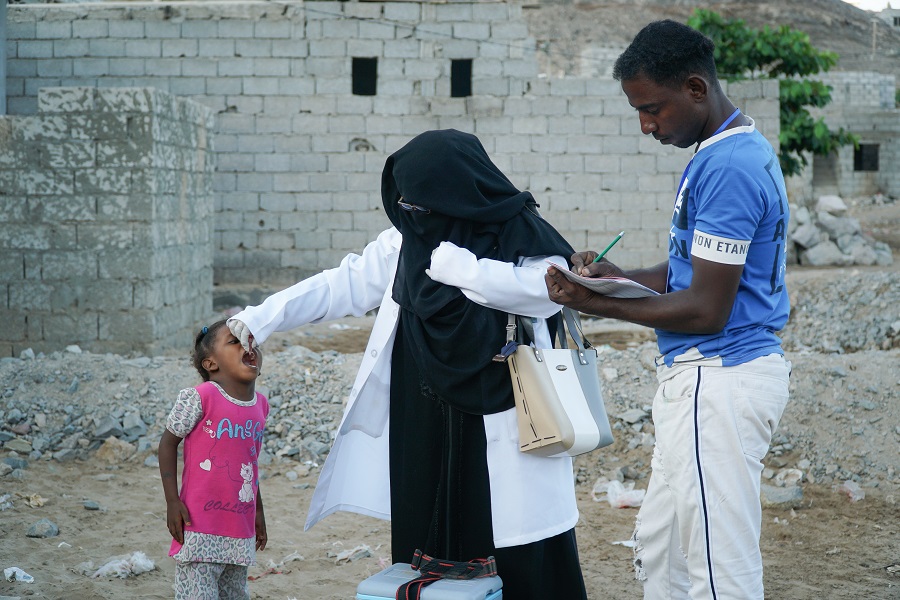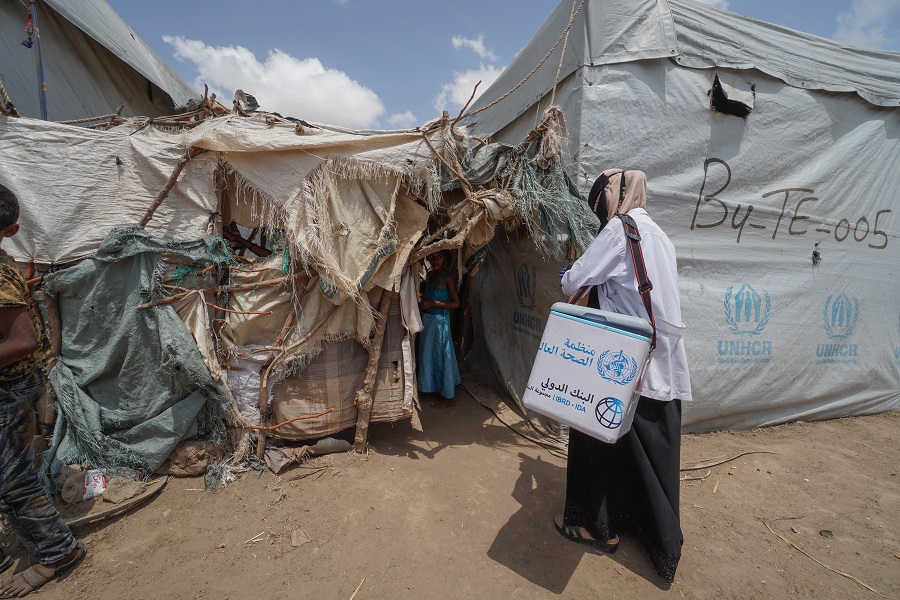
Muneera Abdo is one of thousands of vaccinators across Yemen working tirelessly to reach every last child with polio vaccine
22 June 2021 – In Al-Buraika district, a poor neighbourhood in the port city of Aden in Yemen’s south, Muneera Abdo slowly makes her way through the sandy streets. With a scuffed plastic cool box hanging from a strap on her shoulder, Muneera knocks on the doors of houses often made of little more than discarded strips of tin.
Muneera is a polio vaccinator working in some of the most challenging territory on earth. She travels door to door, vaccinating children under 5 and raising awareness about the importance of vaccination among parents, many of whom are hesitant about vaccines or refuse outright to vaccinate their children.
“My happiest moment is when I serve my community and contribute to saving the lives of children,” said Muneera.
Muneera is one of thousands of vaccinators across Yemen. Their job is simple, yet overwhelmingly tough: reach every last child with polio vaccine, as many times as it takes to stamp out the virus. Vaccinators travel vast distances across deserts and over hills and mountains to reach communities living far from population centres.
Muneera’s job has never been so important. After more than 15 years without a case of polio, an outbreak of vaccine-derived poliovirus was confirmed in Yemen in 2020. Since then, millions of children have received oral polio vaccine on multiple mass immunization days, to boost immunity and stop the outbreak.
Tayseer Ahmed went door-to-door in Thula district, in the steep, long mountains of Amran governorate in the country’s north during the November 2020 and May 2021 campaigns.
“It’s a daunting job,” said Tayseer, “but tiredness fades away whenever I see parents bringing their children to be vaccinated without any hesitancy.”
 Sometimes, vaccinators in Yemen reach the end of a long and difficult road, only to continue on foot for hours more
Sometimes, vaccinators in Yemen reach the end of a long and difficult road, only to continue on foot for hours more
Conflict delays polio campaigns
Without vaccinators like Muneera and Tayseer, Yemen’s damaged health system and the poor sanitation in many villages could see the poliovirus easily spread from child to child across the country. The conflict and instability that have plunged parts of the country into a prolonged humanitarian crisis have lowered vaccination rates and delayed campaigns, leaving more children vulnerable to the virus.
As of 20 June 2021, a total of 34 children have been paralysed in the outbreak. This grim toll highlights both Yemen’s immunity gap and the challenges of delivering health care in a conflict. Immunization rates in Sa’adah governorate – the epicentre of the outbreak – have declined in the past 16 years since the last house-to-house campaign was conducted in 2004.
Responding to the urgent need to deliver vaccination services to all children in this governorate, WHO and UNICEF, in cooperation with the Ministry of Public Health and Population, have conducted health outreach activities there, targeting around 200 000 children under 5 with polio and other vaccines, and offering other health and nutritional support. Additional rounds of outreach will continue over the course of 2021.
The uptake of services has been informative: the main draw for families was the bundle of health services under the heading “Integrated Management of Childhood Illnesses” (IMCI), which supports children under 5 with health care, including vaccinations. In the first round of outreach, trained health workers provided IMCI treatment to 44 624 children under 5. Of these children, 4967 were under 2 months of age and were vaccinated for the first time.
But in order for these efforts to close Yemen’s immunity gap, they need to be sustained – no easy feat.
“Despite all security and humanitarian challenges, we’ve succeeded in conducting several rounds of vaccination campaigns across the country, reaching millions of children with polio vaccine. However, there's still so much work to be done to contain the current outbreak from spreading further,” said Dr Adham Abdel-Moneim, WHO Representative in Yemen.
As vaccinators like Muneera and Tayseer know, that work can only be done step by step, door to door, child by child. It is an immensely tough job – logistically challenging, but also physically and emotionally gruelling. For this reason, the people at the ground level of polio eradication often view their work not as a job, but as a calling.
“For me, protecting children against diseases is more humanitarian work than a paid job,” said Muneera.








